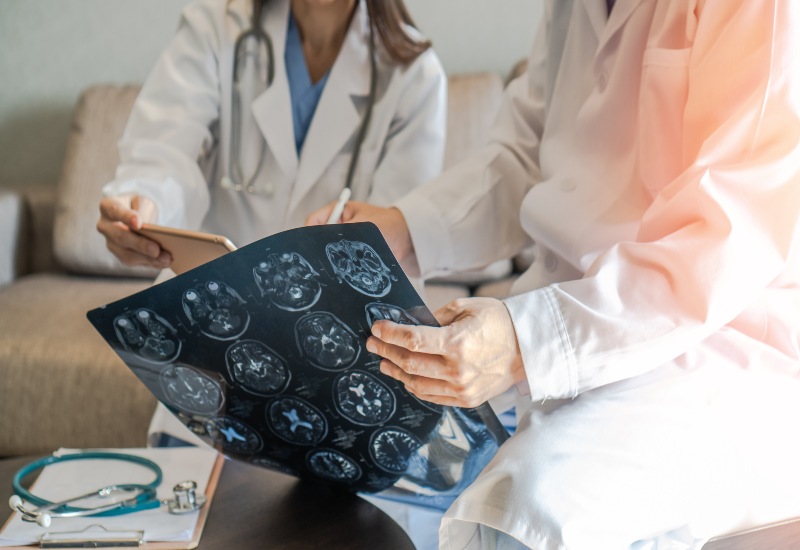Neurotrauma
Diagnosing and Treating Neurotrauma on Long Island
No one wants to think about what would happen in the event of an accident that causes traumatic brain injuries. However, these accidents do happen, and awareness is essential to finding quick treatment and getting on the road to recovery. Dr. Salvatore Palumbo specializes in neurotrauma on Long Island, and over the years, he’s helped countless patients restore their quality of life. Learn more about brain trauma and how our specialist helps people recover from these life-changing injuries.

What Is Neurotrauma?
Neurotrauma refers to any injury to the nervous system, including those affecting the brain, spinal cord, and peripheral nerves. These injuries are often sudden and result from external trauma, such as accidents or falls. Unfortunately, they can lead to temporary or permanent impairments. Here’s a brief overview of the types of neurotrauma:
- Traumatic Brain Injuries—A traumatic brain injury occurs when an external force impacts the brain. These stem from events like falls, car accidents, and sports injuries.
- Spinal Cord Injuries—Spinal cord injuries affect the spine and can disrupt communication between the brain and the rest of the body. In the most severe cases, they may lead to paralysis.
- Nerve Injuries—Peripheral nerve injuries occur due to trauma, crushing, or cutting injuries and lead to pain and numbness.
What Causes Neurotrauma?
As a neurotrauma specialist, Dr. Salvatore Palumbo has seen many causes of neurotrauma firsthand. Some cases occur after seemingly small instances, like a slip and fall, but others come from major accidents. The most common reasons for brain trauma include:
- Motor vehicle accidents
- Falls
- Sports injuries
- Workplace accidents
Are You Experiencing Symptoms of Neurotrauma?
Recognizing the symptoms of neurotrauma is crucial. Symptoms can vary depending on the injury’s location and severity, but here are some common signs:
- Headache
- Nausea or vomiting
- Blurred vision or dizziness
- Difficulty concentrating
- Sensitivity to light or sound
Watch for Moderate to Severe Symptoms
Patients with severe cases of neurotrauma may experience even more significant symptoms. If you notice any of the following, contact a medical professional immediately and visit your nearest emergency room:
- Loss of consciousness
- Seizures or convulsions
- Persistent or worsening headache
- Weakness or numbness in the limbs
- Difficulty speaking or confusion
How We Diagnose Neurotrauma
If you’re worried about brain trauma, visit Dr. Salvatore Palumbo for a diagnosis. While neurotrauma is often apparent, sometimes it requires further testing to confirm. In general, the diagnostic process looks like this:
- Physical Exam—We begin with a thorough exam of your physical state, specifically evaluating your strength, reflexes, and responsiveness.
- Imaging Tests—Next, we’ll likely do some imaging. Tests like CT scans or MRIs provide detailed images of the brain or spine to identify fractures, swelling, or bleeding.
- Neurological Assessment—We may also recommend further neurological assessments to take a closer look at brain function and the peripheral nerves.
Approaches to Treating Neurotrauma
With years of experience as a brain trauma specialist, Dr. Salvatore Palumbo can direct you to the best treatment approaches for your specific condition. Neurotrauma requires precise interventions, and recovery approaches will vary from patient to patient. Depending on your condition, Dr. Salvatore Palumbo may recommend the following in addition to immediate emergency care:
- Medications—Pain relievers, anti-inflammatory drugs, and medications can help reduce swelling or prevent seizures.
- Physical Rehabilitation—After the initial treatment, patients may require physical therapy to regain strength and mobility. Dr. Salvatore Palumbo can connect you with reputable therapists on Long Island.
- Occupational Therapy—Occupational therapy is a big part of recovery for many patients. This therapy helps individuals relearn daily tasks and adapt to new physical limitations.
Strategies for Preventing Neurotrauma
Although not all neurotrauma incidents can be prevented, adopting safety measures can significantly reduce the risk. Our brain trauma specialist may suggest these measures to minimize your chances of neurotrauma in the future:
- Wear Safety Gear—Safety should be your top priority! Always use helmets during sports or riding bikes, and wear seatbelts in vehicles.
- Fall-Proof Your Home—Install handrails, secure loose rugs, and ensure adequate lighting to prevent slips and falls.
- Follow Workplace Safety Standards—Do you have a potentially dangerous job? Be sure to adhere to safety guidelines and use protective equipment at work.
Consult With Dr. Salvatore Palumbo Today
If you’re worried about neurotrauma, don’t wait to see a professional. Prompt treatment is the best way to avoid complications and speed along the recovery process. Dr. Salvatore Palumbo is a neurotrauma specialist serving Long Island, and he can help guide you through this life-altering diagnosis. Contact our office today to make an appointment with Dr. Palumbo.
